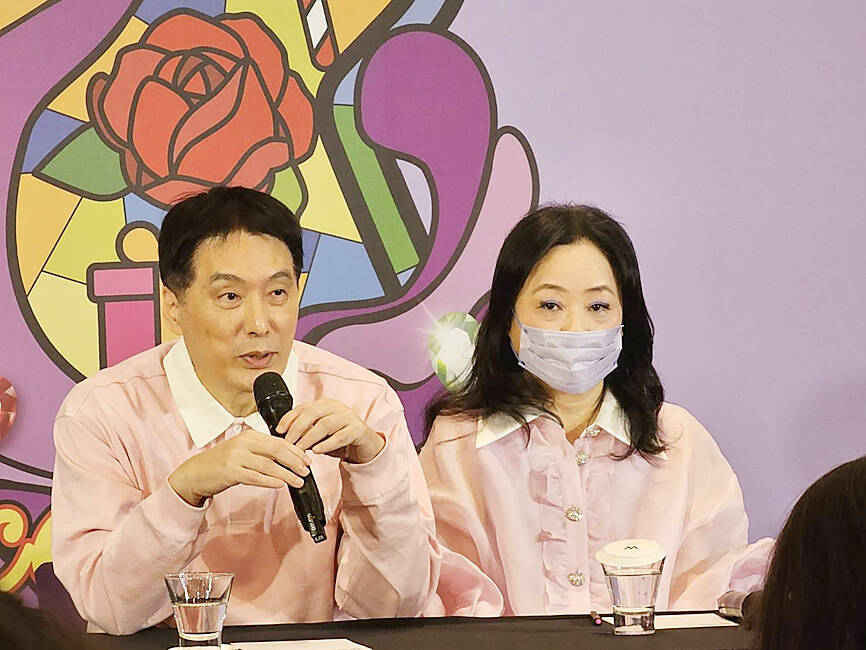Food and retail conglomerate Uni-President Group (統一集團) is set to transform Eslite Spectrum Corp’s (誠品生活) 24-hour bookstore in Taipei’s upscale Xinyi District (信義) into a shopping mall called “Dream Plaza,” adjacent to the group’s existing Uni-President Department Store (統一時代百貨).
Shirley Kao (高秀玲), head of Uni-President’s beauty business, which runs the group’s department stores and the Cosmed (康是美) health and beauty chain, said during a Christmas light switch-on event in Taipei on Friday that the group is to focus on having unique brands stationed in Dream Plaza to give the mall an edge in the already crowded department store scene in Xinyi District.
Kao, the wife of Uni-President Group chairman Alex Lo (羅智先) and the only daughter of the group’s late founder, Kao Ching-yuan (高清愿), said that part of Dream Plaza could be open around the clock, all week, including a flagship Starbucks store — the franchise in Taiwan is owned by the conglomerate — but that this would depend on consumer demand.

Photo: CNA
Xinyi Eslite is scheduled to bid farewell to fans on Christmas Eve after failing to convince Uni-President, the current landlord, to extend its lease.
The Xinyi store began opening 24 hours a day in mid-2020 after the Eslite Dunnan store was closed following the expiration of its lease at the end of May that year. After the closure of the Xinyi branch, the Songyan outlet, in Songshan Cultural and Creative Park, is to succeed the outlet and be open around the clock, all week.
The newly refurbished Songyan store would open no later than January next year, Eslite said.
Commenting on the group’s beauty business, Kao said that the existing Dream Mall in southern Taiwan has more than 800 vendors, while the Cosmed chain owns 100 pharmacies around Taiwan and is set on turning more of its outlets into 600m2 mini-department stores.
Uni-President Group has also acquired hypermarket operator Carrefour Taiwan after completing an acquisition earlier this year.
In the first nine months of this year, Carrefour Taiwan incurred a loss of NT$1 billion (US$31.4 million). Lo said new management would try to ensure the hypermarket chain improves its bottom line by streamlining operations.
The group would continue to expand its logistics business by setting up large logistics compounds around Taiwan, he added.
Regarding the 7-Eleven convenience store chain, Lo said there are plans to open more than 300 stores in Taiwan next year, boosting the total number to 7,111 branches.
Meanwhile, there are around 3,500 7-Eleven outlets in the Philippines, which is an 84 percent share of the convenience store market in the Southeast Asian country, with the number of shops expected to rise to 4,000 next year.

SEMICONDUCTORS: The German laser and plasma generator company will expand its local services as its specialized offerings support Taiwan’s semiconductor industries Trumpf SE + Co KG, a global leader in supplying laser technology and plasma generators used in chip production, is expanding its investments in Taiwan in an effort to deeply integrate into the global semiconductor supply chain in the pursuit of growth. The company, headquartered in Ditzingen, Germany, has invested significantly in a newly inaugurated regional technical center for plasma generators in Taoyuan, its latest expansion in Taiwan after being engaged in various industries for more than 25 years. The center, the first of its kind Trumpf built outside Germany, aims to serve customers from Taiwan, Japan, Southeast Asia and South Korea,

Gasoline and diesel prices at domestic fuel stations are to fall NT$0.2 per liter this week, down for a second consecutive week, CPC Corp, Taiwan (台灣中油) and Formosa Petrochemical Corp (台塑石化) announced yesterday. Effective today, gasoline prices at CPC and Formosa stations are to drop to NT$26.4, NT$27.9 and NT$29.9 per liter for 92, 95 and 98-octane unleaded gasoline respectively, the companies said in separate statements. The price of premium diesel is to fall to NT$24.8 per liter at CPC stations and NT$24.6 at Formosa pumps, they said. The price adjustments came even as international crude oil prices rose last week, as traders

SIZE MATTERS: TSMC started phasing out 8-inch wafer production last year, while Samsung is more aggressively retiring 8-inch capacity, TrendForce said Chipmakers are expected to raise prices of 8-inch wafers by up to 20 percent this year on concern over supply constraints as major contract chipmakers Taiwan Semiconductor Manufacturing Co (TSMC, 台積電) and Samsung Electronics Co gradually retire less advanced wafer capacity, TrendForce Corp (集邦科技) said yesterday. It is the first significant across-the-board price hike since a global semiconductor correction in 2023, the Taipei-based market researcher said in a report. Global 8-inch wafer capacity slid 0.3 percent year-on-year last year, although 8-inch wafer prices still hovered at relatively stable levels throughout the year, TrendForce said. The downward trend is expected to continue this year,

POWERING UP: PSUs for AI servers made up about 50% of Delta’s total server PSU revenue during the first three quarters of last year, the company said Power supply and electronic components maker Delta Electronics Inc (台達電) reported record-high revenue of NT$161.61 billion (US$5.11 billion) for last quarter and said it remains positive about this quarter. Last quarter’s figure was up 7.6 percent from the previous quarter and 41.51 percent higher than a year earlier, and largely in line with Yuanta Securities Investment Consulting Co’s (元大投顧) forecast of NT$160 billion. Delta’s annual revenue last year rose 31.76 percent year-on-year to NT$554.89 billion, also a record high for the company. Its strong performance reflected continued demand for high-performance power solutions and advanced liquid-cooling products used in artificial intelligence (AI) data centers,